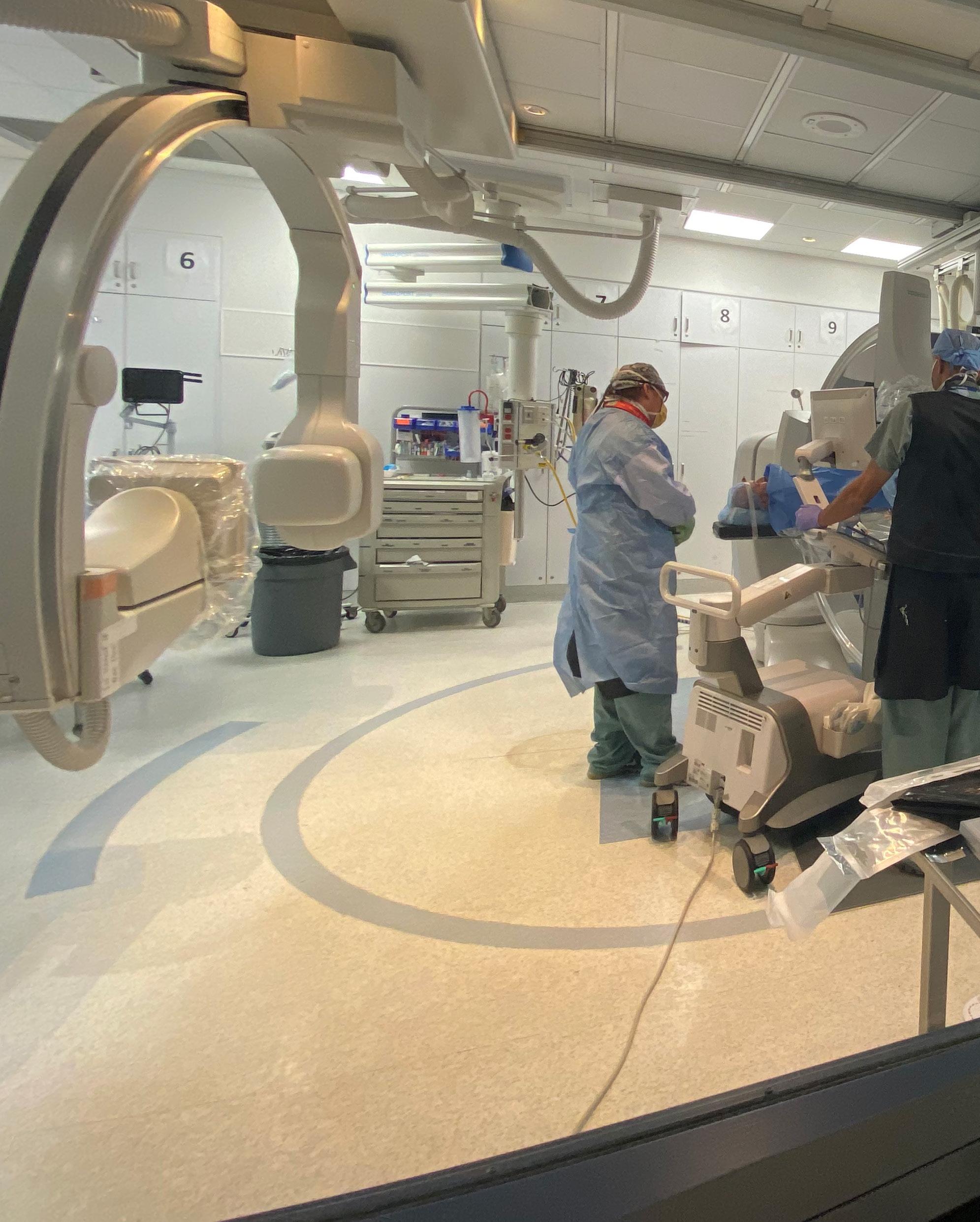
10 minute read
McGill University Health Centre
CARING
FOR QUEBEC
The McGill University Health Centre is a forward-thinking health center in the Canadian medical sector. We speak to President and Executive Director, Pierre Gfeller, regarding the progressive facilitation of medical services in and around the region
Writer: Marcus Kääpä | Project Manager: Felix Revell
The demand for healthcare services is only growing. Since the onset of the COVID19 pandemic, the medical space has formed a frontline in which technology and modernization have pooled together to help overcome a global crisis.
In Canada, healthcare and social services are managed by the provinces, and it is in this medical sector that McGill University Health Centre (MUHC) operates. A complex and sophisticated academic health center that provides tertiary
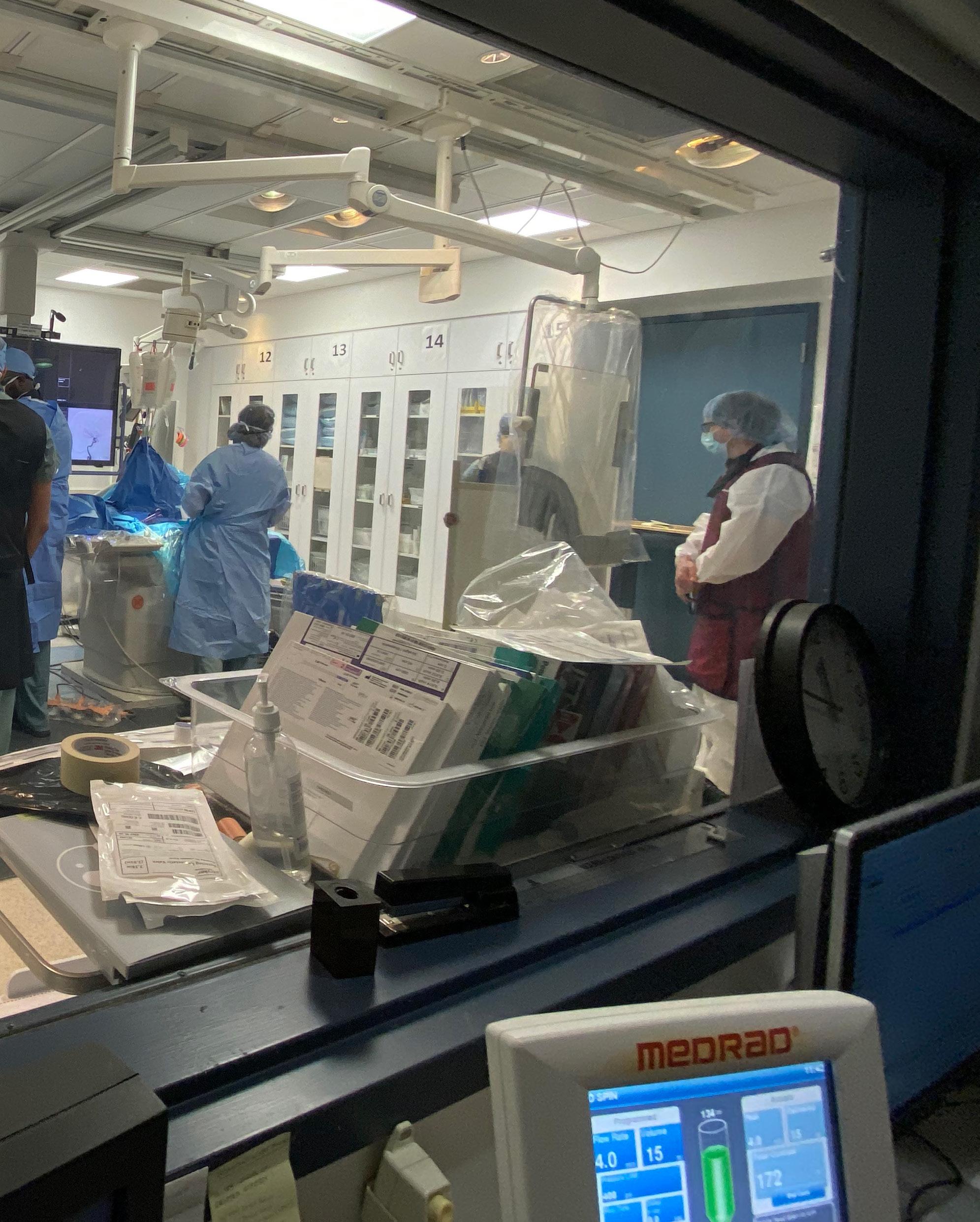
and quaternary care, the MUHC also provides additional primary, secondary, and palliative care services to the adult and pediatric population of Montreal and, through McGill University’s RUISSS (Réseau Universitaire Intégré de Santé et Services Sociaux), to the west of the province of Quebec.
“Through our affiliation with McGill University, we ensure teaching and training for students, residents, and researchers,” introduces Pierre Gfeller, President and Executive Director of the MUHC, who completed his four-and-a-half-year mandate at the beginning of January. “Our Research Institute conducts fundamental, clinical, and evaluative research to accelerate discovery and innovation that will improve human health. Finally, we also evaluate the introduction, acquisition, and use of new health technologies, as well as methods of organizing and delivering services. Our hospitals are open 24 hours a day, 365 days a year, and operate at the Glen Site, the Montreal General Hospital, the Neuro, the Lachine Hospital, as well as other sites in Montreal.”
The MUHC works with the Quebec Government to offer services to the population of the province and is made up of a community of more than 16,000 people. Yearly, the MUHC admits more than 34,000 patients, treats more than 160,000 patients in the emergency department, performs more than 28,500 surgeries, delivers almost 3,000 babies, and completes more than 33 million diagnostic and therapeutic tests and procedures. Additionally, every year, half a million patients come to the MUHC’s hospitals for ambulatory visits.
THE CENTER OF THE MUHC
The realm of healthcare is one that is constantly changing to keep up with growing populations and an advancing medical technology sphere. Dr. Gfeller has operated in the
NORTH AMERICA OUTLOOK: CAN YOU TELL US ABOUT YOUR EXTENSIVE EXPERIENCE IN THE MEDICAL SPACE?
PIERRE GFELLER, PRESIDENT AND EXECUTIVE
DIRECTOR: “I have built a dynamic career in healthcare over nearly 40 years that includes a host of roles and accomplishments. I started as a family physician and practiced medicine from 1981 to 2002.
“Following this, as a senior executive, I served in both consultancy and management. My goal was to mobilize teams to get results and contribute to the reorganization of institutions and services. From 2012 to 2015, I was Executive Director at Sacré-Coeur Hospital and from 2015 to 2018, President and Executive Director of the Integrated University Health and Social Services Centre (CIUSSS) for the Nord-de-l’Île-de-Montréal sector. This extensive experience was instrumental in preparing for my role as President and Executive Director of the MUHC in May 2018.
“From the get-go, my overarching objective was to help the organization perform at the highest level with exemplary governance and teamwork, a respectful, stimulating, safe and ethical workplace, innovation and excellence in all aspects of its mission, and stakeholder engagement.”
GE HealthCare
McGill and GE HealthCare have been collaborative partners for several decades on many projects across modalities such as MR, CT and X-Ray. We are proud to collaborate with such a world-class research institution that has scored among the top three of Canada’s Top 40 Research Hospitals. This strong partnership forms the foundation for the latest collaborative effort that seeks to modernize healthcare delivery while supporting equitable access to healthcare in rural communities.
For patients in remote communities who need hours to reach a specialized health care center, a fast diagnosis can mean the difference between life and death. By using an artificial intelligence (AI) - driven system to prioritize and highlight areas of radiological interpretation for urgent imaging findings, we hope to increase the accessibility and quality of specialized care provided to our remote communities.
Each year, MUHC radiologists examine over 190,000 x-rays, 100,000 CT scans, 40,000 MRIs and 70,000 ultrasounds. Approximately 12,000 x-rays and 1,000 ultrasounds per year come from Northern health regions. Dr. Caroline Reinhold and colleagues devised this unique project that takes a pragmatic approach to using AI to analyze emergency medical images that require urgent review, helping to accelerate care and potentially save lives.
Thanks to the donations from GE HealthCare, TD and Intel, this initiative will have a positive impact on the individuals living in the Nord-duQuébec and Abitibi-Témiscamingue regions. In the near future, this project could considerably impact many of the seven million Canadians who currently live in rural communities.
www.gehealthcare.ca
sector for almost 40 years and has witnessed first-hand the impact of the COVID-19 pandemic alongside the many changes that have taken place.
“The COVID-19 pandemic was an especially difficult time for our patients and the community at large, for our partners across the health and social services network, and for us as a team,” he tells us. “Throughout the past years, we have “kept calm and carried on”. Our staff showed their true colors from day one of pandemic preparedness in January 2020, to the actual management of it during the multiple waves, and even today as it continues to be a part of our new reality. Leadership, compassion, generosity, talent, dedication, teamwork, and resilience - this was and is the MUHC.”
For Dr. Gfeller, the COVID-19 pandemic has changed many things, one example of which is telemedicine which has been used much more extensively. One of the goals of the MUHC’s strategic plan is to leverage data that is produced by its clinical services and provided to patients. This will enable the MUHC to innovate through research, teach future professionals, and introduce new treatments and trajectories in clinical care for patients. The implementation of an electronic medical record, which is still absent in most of Quebec, is a goal currently pursued by the MUHC.
NEW AGE HEALTHCARE
Furthering the notion of modernization, the MUHC is undertaking a project to improve a community hospital, valued at CAD$225 million. The Lachine Hospital is a community hospital based in the West Island of Montreal and includes the CHSLD Camille Lefebvre. This major modernization project will expand the hospital and upgrade certain units in the historic building.
Once completed, it will allow the hospital to maintain its high quality
NORTH AMERICA OUTLOOK: CAN YOU TELL US ABOUT THE MUHC’S PEOPLECENTRIC SUPPORT AND TRAINING?
PIERRE GFELLER, PRESIDENT AND EXECUTIVE
DIRECTOR: “I strongly believe that solid infrastructures are the requisite foundation for the delivery and teaching of healthcare, as well as the conducting of research, and that people are the cornerstones to success.
“With that in mind, over and above stewarding projects to modernize physical space, technology, and equipment at the MUHC, we have sought to ensure that talented experts are positioned in key clinical, administrative, and research positions. Respect is one of our core values, so we want to see equity, diversity and inclusion become second nature not only to employment practices, but also to relationships with the patient population. I am also a firm believer in strengthening our relations with the university, our foundations, and our community.
“As far as training goes, the MUHC is the primary training site for health and social services students of McGill University. We also welcome residents and fellows from around the world in various specialties, who spend a certain period of their training with us to perfect certain techniques or treatment methods.”
bioMérieux
To avoid the next pandemic, preserving the effectiveness of antibiotics should be a priority for everyone.
For close to 60 years, bioMérieux has been dedicated to fighting infectious diseases and improving public health. The solutions that our teams design, develop and manufacture are key to giving healthcare professionals and industry stakeholders the confidence to make decisions to improve patient outcomes and ensure consumer safety.
Present in Canada since 1993 with headquarters in Québec, 80 percent of the solutions we develop are used to combat antimicrobial resistance.
We provide diagnostic tests based on a comprehensive syndromic approach to infectious diseases that helps to quickly and accurately identify the major viral and bacterial pathogens with resistance mechanisms causing an infection. It enables physicians to choose the best therapy and clinical pathway for their patients. Our diagnostic technology is based on high complexity ‘state of the art’ molecular technology that is accurate, rapid, and easy to use that helps make the world a healthier place.
We are committed to addressing resource inequalities associated with pathogen identification, which can be time-consuming and cause delays in hospital stays.
Lab professionals in healthcare networks such as the McGill University Health Centre (MUHC) are now able to determine the most appropriate treatment to improve patient care with our solutions adapted to their requirements.
Overuse or misuse of antibiotics is one of the leading causes of antimicrobial resistance. bioMérieux aims to ensure patient safety by providing a more accurate diagnosis, which guides healthcare professionals in the responsible use of antibiotic treatment.
biomerieux.com

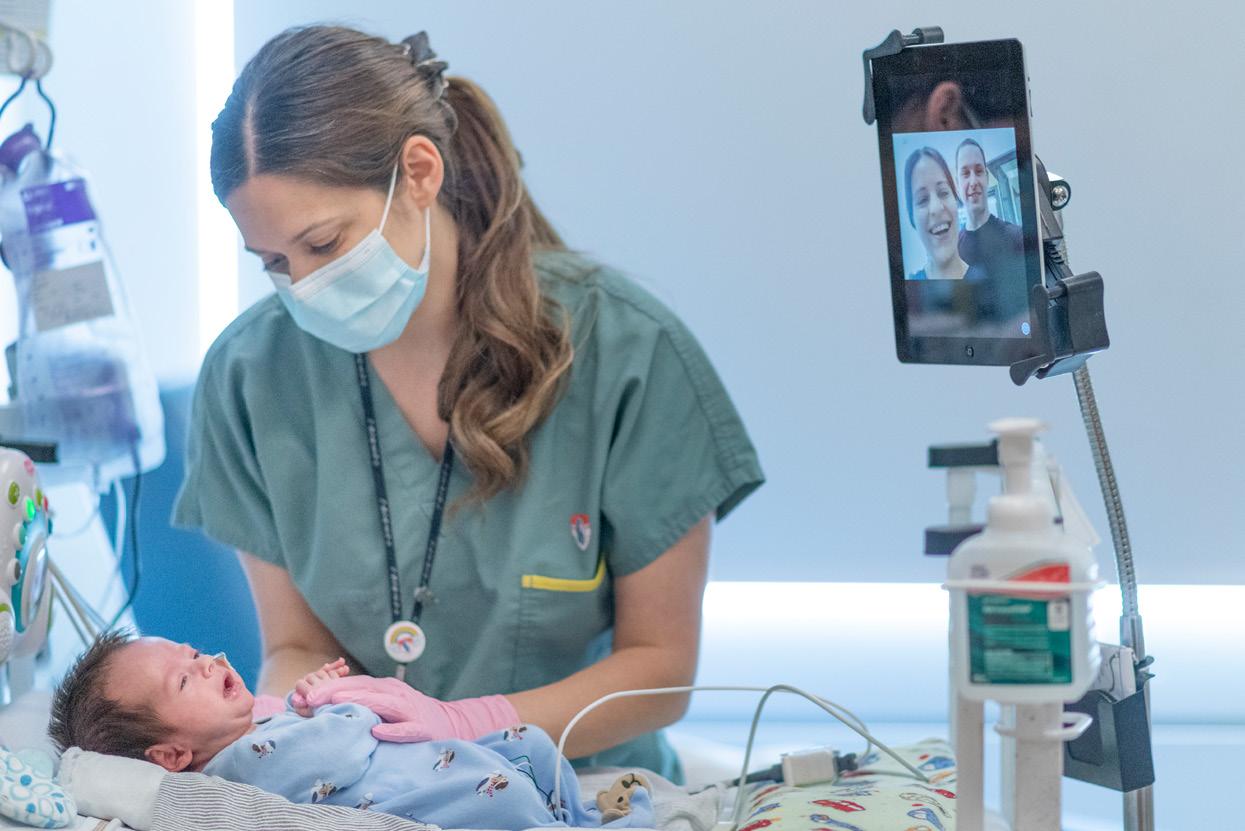
Glen site
of care and provide patients with modern facilities and individual rooms.
“From the beginning, we decided to put patients and their families at the center of care processes and improve their experience,” Gfeller elaborates. “We organized a series of workshops, with the active participation of patient partners, staff, the hospital’s clinical and administrative leadership, and the planning and coordination teams, to develop the functional program. Thanks to the commitment and efforts of the participants in each workshop, the objectives to be achieved are even more precise and more anchored in the reality of the patients.”
The MUHC has its vision tuned to the future and has taken to addressing areas of healthcare that are more prominent today than ever before. The Specialized Centre for Adolescent Mental Health (Le SPOT Montréal) is one of the largest ambulatory centers in Canada for teens in suicidal crisis. It is a teen-friendly center in a calming setting, located within walking distance of The Montreal Children’s Hospital. It offers an alternative to hospitalization, allowing teenagers to continue with school and their other regular activities.
“At Le SPOT Montréal, a multidisciplinary team will use evidence-based treatments to provide adolescents aged 12-18 and their families with up to 12 weeks of intensive, individualized therapy to help alleviate the suicidal crisis and
Nurse at the MCH NICU

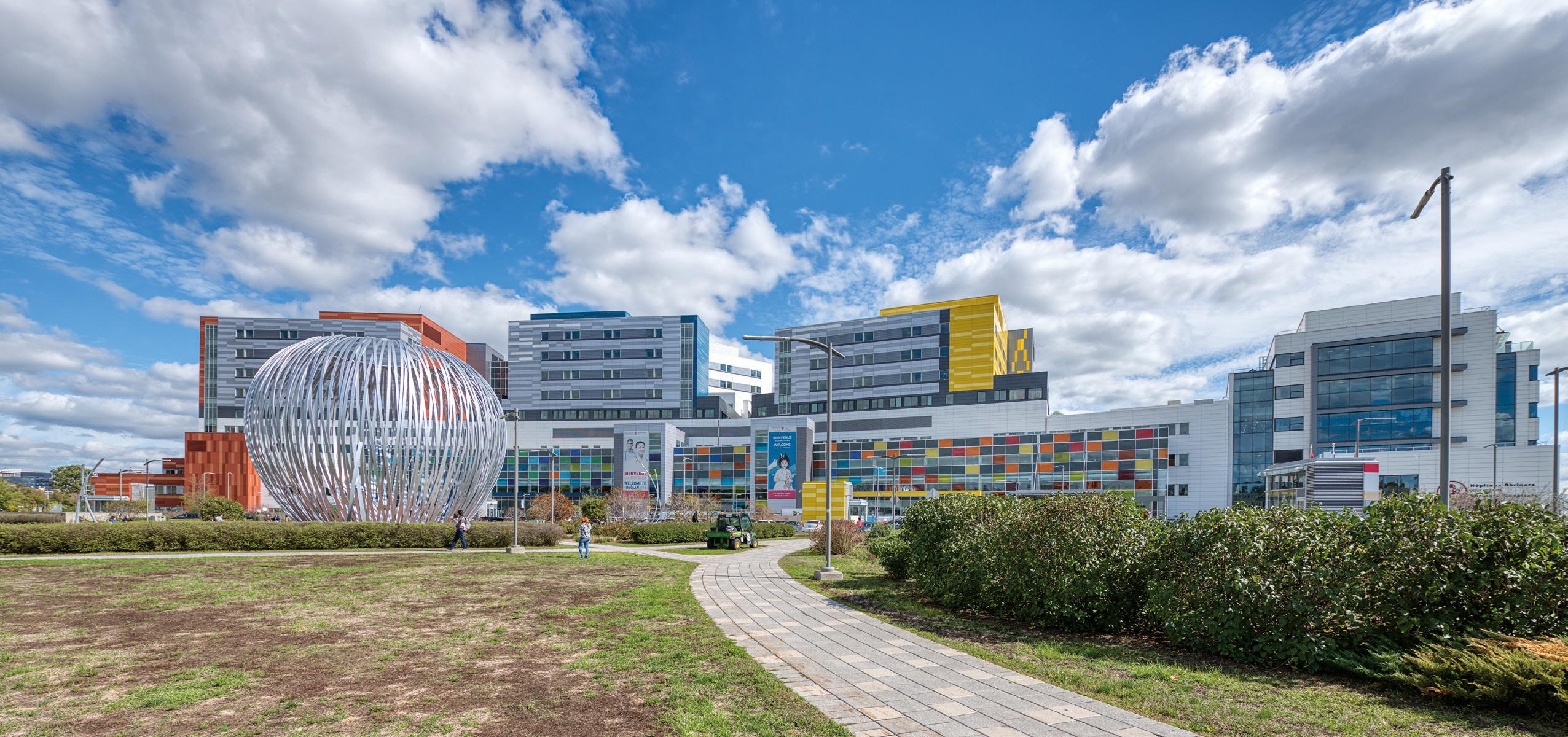
Lachine Hospital Modernization Project
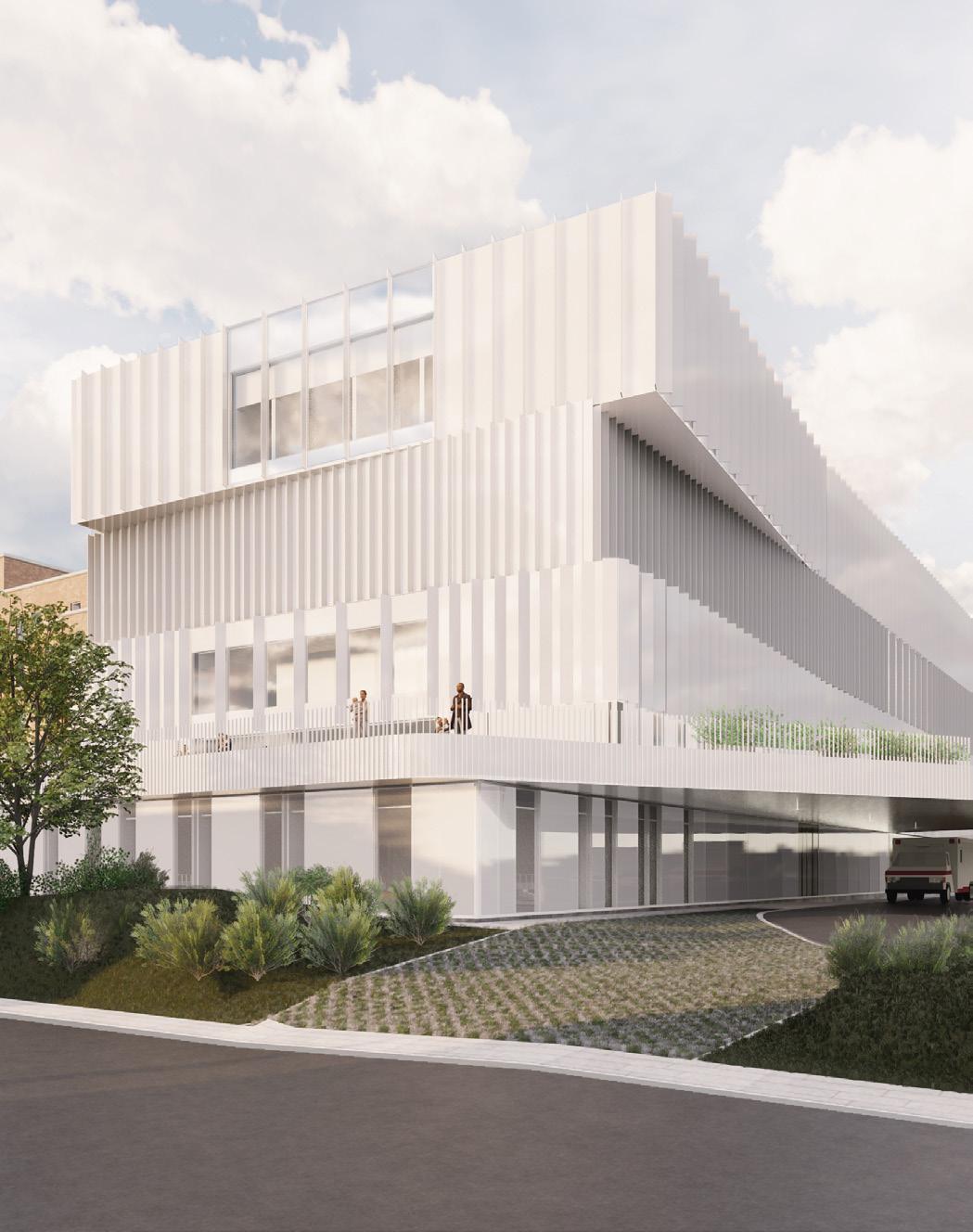
offer coping skills to better manage psychological distress,” Gfeller explains. “The team will also ensure that patients and families transition smoothly to community services for ongoing support.”

FACILITATING THE FUTURE
One of the MUHC’s primary aims moving forward is to facilitate medical services that are not available on Canadian soil. Proton therapy is one such service and is an alternative to conventional radiotherapy that is preferred for cancers in sensitive locations such as the head, neck, and central nervous system (CNS). It prevents the development of late complications related to traditional radiotherapy.
“It is not available in Quebec, so eligible patients – mostly children, adolescents, and young adults — are sent to the US to receive treatment,” Gfeller says. “We are waiting for the go-ahead from the provincial government to start a proton therapy center at the MUHC, which would be financed in large part by our foundations.”
The MUHC holds the additional goal of refocusing its collective mission to provide tertiary and quaternary care, better communicate and interact with patients and their families, be the employer of choice in the Montreal healthcare network, and use the data generated by its clinical interactions in its research and teaching activities to continue to be a learning and innovative organization.
“In line with our strategic planning theme Work as One, we want to break all the barriers that exist between specialties, age groups, pediatrics, and adult medicine in order to work efficiently and build up synergy for a better healthcare ecosystem in Quebec.”
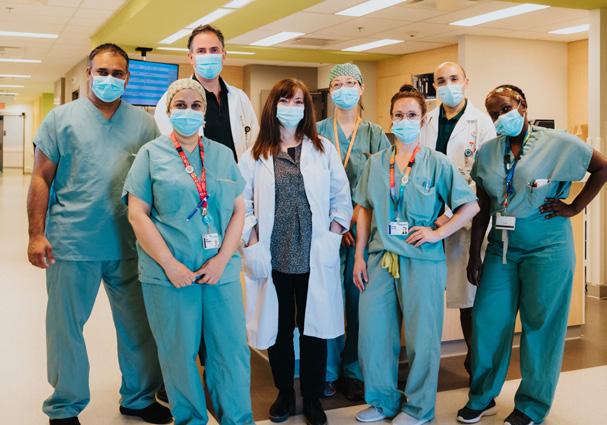
cima.ca
Photo: Clément Robitaille
Nurse at the Cath lab of the MUHC
MCGILL UNIVERSITY HEALTH CENTRE
muhc.ca










